Theatre reviews: Let The Right One In, Dundee Rep | Volpone, Glasgow


Let The Right One In - Dundee Rep
* * * *
Volpone - Oran Mor, Glasgow
* * *
Sweden, 1968: you might think there was no better place and time in human history to be born, in a country that represented, at that moment, the very peak of enlightenment values and postwar social-democratic affluence. Beneath the surface, though, a new darkness was stirring; and that’s perhaps why the writer John Ajvide Lundqvist, born in Stockholm in that year, eventually became a kind of poet of the end of enlightenment, and of how any encounter with evil, even in the best-run society, can open the door to a different and much more brutal world.
Now, Lundqvist’s 2004 novel (and 2008 film) Let The Right One In has been adapted for the stage, in John Tiffany’s farewell production for the National Theatre of Scotland; and if the stage show is less ambitious in its social and political resonances than the film version, this swan song production from the man who directed Black Watch – the landmark Scottish theatre event of the past 15 years – still makes for a chill and moving piece of theatre, full of pain, terror and unexpected moments of comedy. Christine Jones’s set fills the beautiful, spacious Dundee stage with towering birch trees from Tentsmuir Forest, evoking an entire Nordic setting in a single gesture; and although the film’s insistent backdrop of bleak, efficient 1970s architecture is absent, Jones’s open stage, superbly lit by Chahine Yavroyan, makes a fine, flowing arena for the story of young Oscar, a lonely and bullied 12-year-old with a stressed-out single mother, who finds himself needed and perhaps loved – for the first time in his life – when he strikes up a friendship with a strange new neighbour called Eli, a girl who only comes out at night.
Advertisement
Hide AdEli will not call herself a vampire, and cannot help what she is; but as the middle-aged man who cares for her weakens and fails, she begins to prey on Oscar’s loneliness, trading her unshakeable loyalty, and defence of Oscar against the terrifying school bullies, for what we begin to sense will be the sacrifice of his whole lifetime. The subtext of the play, in this version scripted by Jack Thorpe, is not about the bigger picture of a complacent society that thinks it has solved all its problems, but about the detail of how children and adolescents are failed – and also selfishly abused – by key adults in their lives. Oscar’s father is far away, and emotionally unavailable. His mother is needy, clinging and often drunk. His teachers fail to prevent the bullying that makes him vulnerable; and Eli’s guardian clings to her like a long-rejected lover, in a chilling image of something that looks like a parental relationship, but is in fact quite other.
In Tiffany’s ambitious and beautifully shaped production, all this is conveyed with great force by a brilliant cast, led by young stars Martin Quinn and Rebecca Benson as Oscar and Eli, with Lorraine McIntosh as Oscar’s mum, Paul Hickey as his dad, Chris Reilly as a teacher and a policeman, and a heartbreaking Ewan Stewart as Eli’s carer, Hakan. There’s the odd disappointment here and there, in Tiffany’s take on the story. There’s a slight tendency to trade too much on the comic collision between vampire imagery and banal suburban life. There’s a certain familiarity about the choreographic style, to anyone who remembers Tiffany’s previous collaborations with associate director Steven Hoggett. And sometimes – as in the play’s final sequence – there’s a tendency to throw big money at technical solutions to staging problems, rather than focusing on their artistic and emotional meaning.
None of this, though, can diminish the sheer force of the story, the desperate poignancy of Oscar’s situation, and the nightmarish tragedy of Eli’s eternal exile from humanity. In the end, we watch a boy give his life away, for the chance of a little real contact with another being, however strange and savage; and this fine, heartfelt interpretation gives full weight to Lindqvist’s terrible warning that children who are failed by the society we have made – and not always in the most obvious ways – may turn into something we can barely recognise, cold, unforgiving, and truly frightening.
If Let The Right One In is a story about the end of enlightenment – a time when the values of reason and science are increasingly challenged by a new age of fear and superstition – then Ben Jonson’s Volpone is a play from the very beginning of the modern period, an era when old religious and ethical structures were being swept aside by a new kind of individualism: materialistic, grasping, and very much of this world.
In the first show of this summer’s lunchtime Classic Cuts season at Oran Mor, the actor Andy Clark turns his hand to adapting and directing, setting himself the huge challenge of transforming Jonson’s massive 1606 text – about a greedy old miser and his boundless lust for gold – into a 50-minute show for just four actors; the result is an odd mixture of joyfully clever invention, and slightly aimless classical acting.
Kirstin McLean gives a truly memorable double performance as Volpone’s servant Mosca, and the lovely Celia, a virtuous wife whose sexual favours her husband tries to trade for inclusion in Volpone’s will; Stephen Clyde is in fine form as the thuggish husband and various other rogues. And the whole business of covering the story with only four actors is carried through with a breathless, shape-changing ingenuity; even if the reason for all the effort is only intermittently visible, among the flouncing costumes, and ever-changing hats.
• Let The Right One In runs until 29 June; Volpone until 15 June.